For manufacturers and distributors, B2B eCommerce has evolved far beyond a simple online catalog. The technology now offers powerful tools designed specifically for complex business transactions, long-term client relationships, and intricate supply chains.
Modern B2B eCommerce solutions are built to handle contract-specific pricing, corporate account hierarchies, automated approval workflows, and deep integration with your existing ERP and fulfillment systems. However, many businesses still only scratch the surface of what’s possible, using their sites for little more than product browsing.
This guide explores ten essential features that define a powerful B2B eCommerce platform. For each one, we’ll cover what it does, why it’s critical for growth, and what you should look for when choosing a solution to elevate your business operations and customer experience.
1. Robust Corporate Account Management
Corporate account management allows your business customers to replicate their internal purchasing structures within your platform. This means a single client account can have multiple users with different roles, such as purchasing managers, buyers, and approvers for large orders. This feature organizes the buying process, prevents unauthorized spending, and gives your sales team a clear view of decision-makers.
Key capabilities include:
- The ability to create multiple users under a single corporate account with distinct roles and permissions.
- Customizable spending limits and approval workflows tailored to different user roles.
- Support for parent-child account hierarchies, ideal for companies with multiple branches or subsidiaries.
- A “login as customer” or impersonation feature that lets sales reps or support staff assist clients directly.
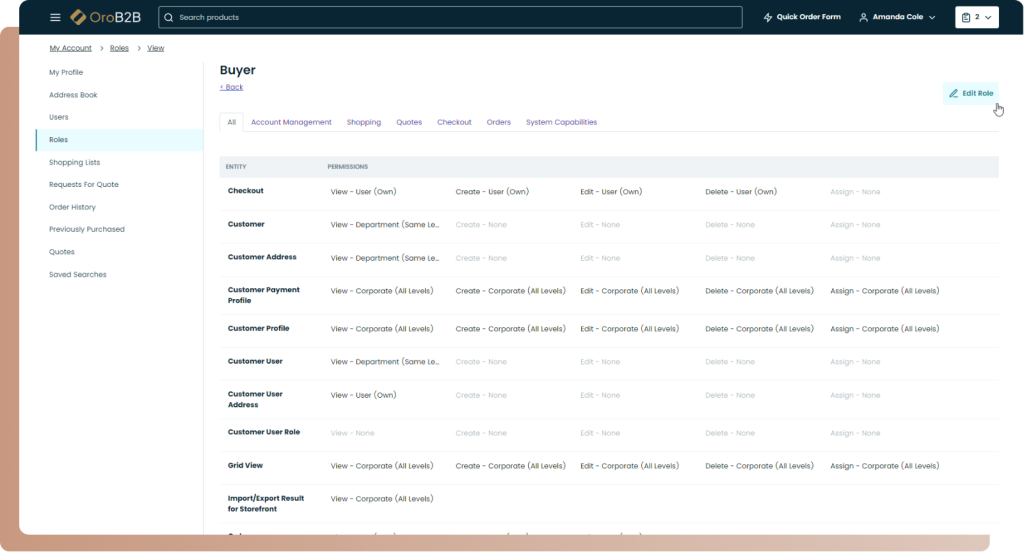
2. Personalized Pricing and Product Catalogs
In B2B, one price rarely fits all. Personalized pricing and catalogs ensure that each customer sees the specific terms, products, and discounts outlined in their contract. One client might view bulk pricing on a full catalog, while another may have access only to an exclusive product line. This alignment with your ERP and contracts eliminates confusion and builds trust.
Key capabilities include:
- Support for multiple, distinct price lists based on customer, group, or contract.
- Tiered and volume-based discounts that apply automatically.
- Real-time synchronization with ERP or PIM systems for price accuracy.
- The ability to create custom catalogs or restrict product visibility for specific customer segments.
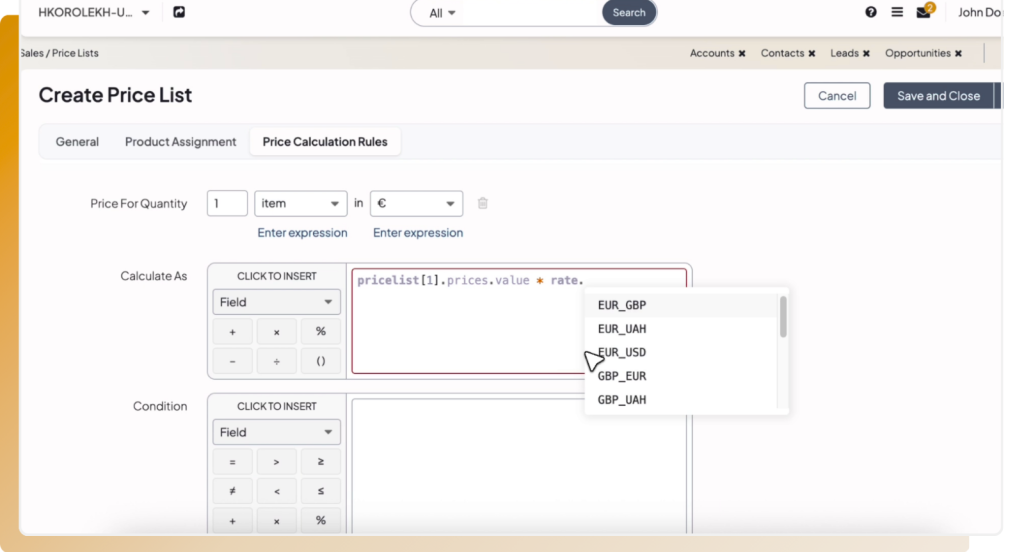
3. Support for Multiple Business Units and Storefronts
Many B2B companies operate multiple brands, regional divisions, or distinct business units. A platform with multi-organization capabilities allows you to manage these entities from a single, centralized backend while giving each a unique storefront. One division can have its own branding, currency, and pricing, while you maintain oversight of all data, user permissions, and analytics.
Key capabilities include:
- A unified backend that can manage multiple organizations or business units.
- The ability to launch separate websites or storefronts with localized content, currencies, and tax rules.
- Options to share or isolate product data, pricing, and customer information across different entities.
- Centralized administration for streamlined management and reporting.
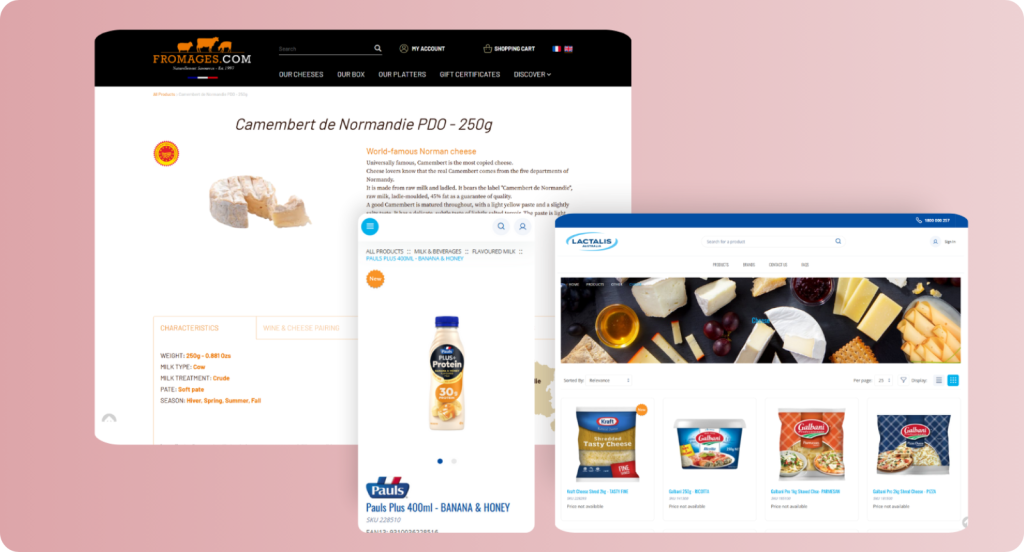
4. Integrated Content Management System (CMS)
Complex B2B products often require detailed specifications, certifications, and guides to inform purchasing decisions. A powerful, integrated CMS allows your team to create, manage, and deploy this crucial content without relying on developers. Well-organized product information not only helps buyers but also significantly improves your site’s search engine optimization (SEO).
Key capabilities include:
- A built-in page builder with an intuitive drag-and-drop interface.
- Reusable content blocks for consistent product highlights, specifications, and marketing messages.
- Full support for multiple languages and content localization.
- Visual merchandising tools to create featured product collections and promotions.
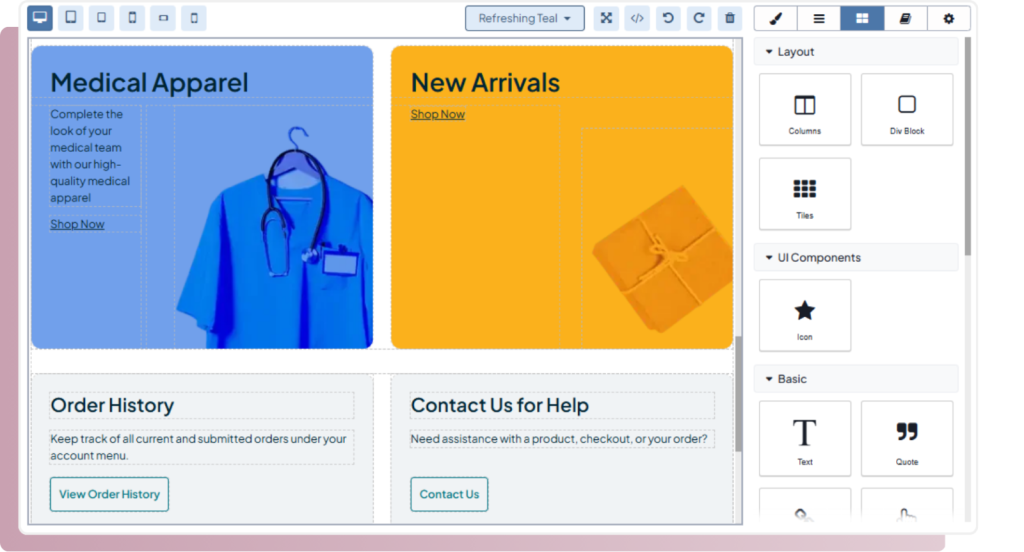
5. Effortless Bulk Ordering and Reordering
B2B buyers frequently purchase large quantities of the same items. Forcing them to manually add products to a cart one by one creates unnecessary friction. Bulk ordering tools streamline this process, allowing customers to upload order lists or quickly replicate past purchases, keeping them on your platform instead of turning to offline methods.
Key capabilities include:
- The ability to upload orders via CSV or other spreadsheet formats.
- A quick order form for fast entry using SKUs or part numbers.
- Saved shopping lists or requisition templates for frequently ordered items.
- One-click “reorder” functionality from the customer’s order history.
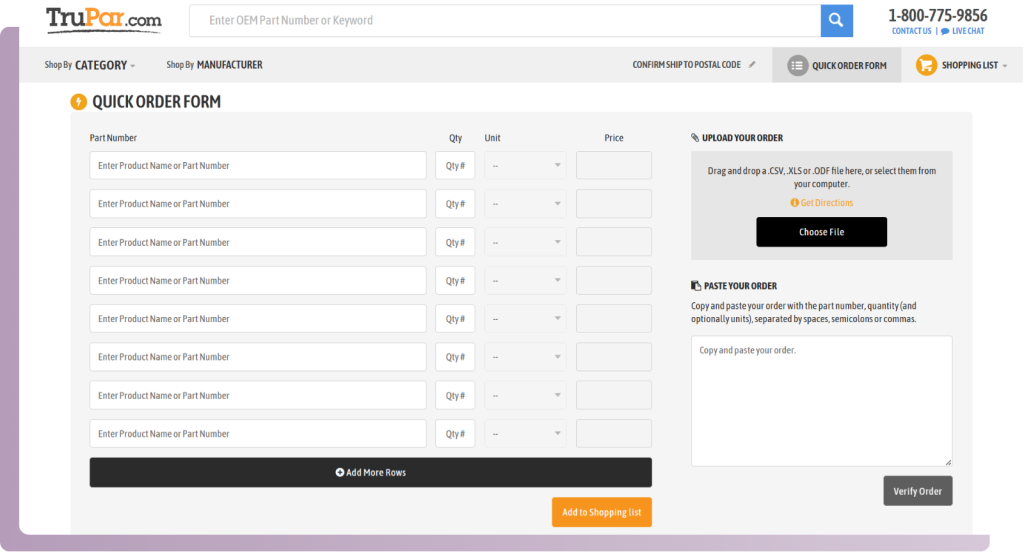
6. Flexible B2B Payment Options and Credit Terms
Business buyers expect payment options that reflect how they operate. If your platform only accepts credit cards, you risk alienating large accounts that rely on purchase orders or net payment terms. Supporting flexible payment methods is essential for aligning your online channel with standard B2B sales practices.
Key capabilities include:
- A variety of payment methods, including purchase orders (PO), ACH, and wire transfers.
- Configurable payment terms (e.g., Net 30, Net 60) that can be assigned to specific customers.
- Built-in tools for managing credit limits, invoicing, and contract terms.
- Seamless integration with your accounting or ERP system to synchronize all billing data.
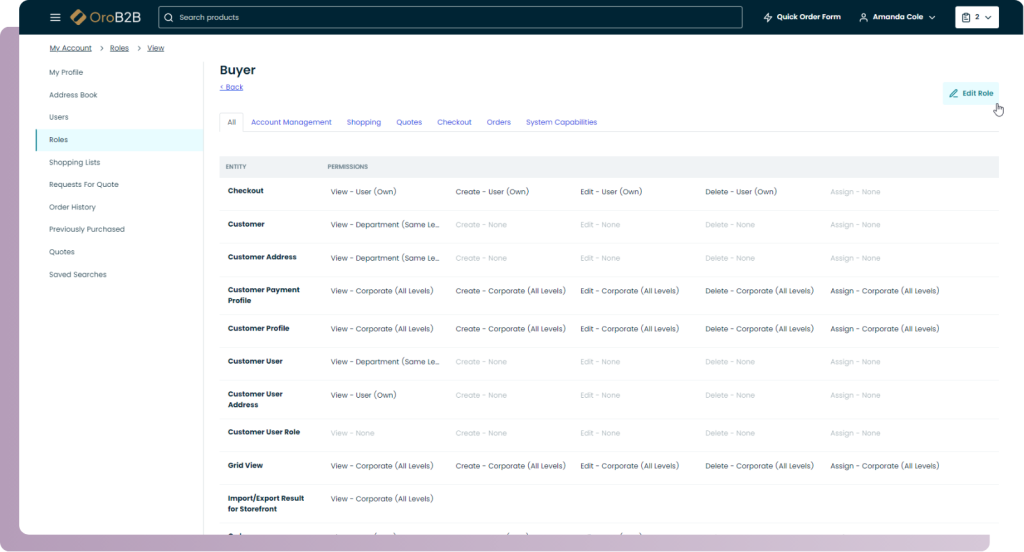
7. Customizable Workflow Automation
Every business has unique processes for quoting, order approval, and fulfillment. A flexible B2B eCommerce platform should adapt to your workflows, not the other way around. Workflow automation can route RFQs to the correct sales rep, apply complex pricing rules, and trigger notifications at each stage of the buying journey, ensuring consistency and accountability.
Key capabilities include:
- A visual workflow editor that allows you to customize business logic without writing code.
- Automation capabilities for Request for Quote (RFQ), Configure, Price, Quote (CPQ), and order management.
- Customizable triggers for email notifications, internal tasks, and escalations.
- A complete audit trail that provides visibility into every transaction.
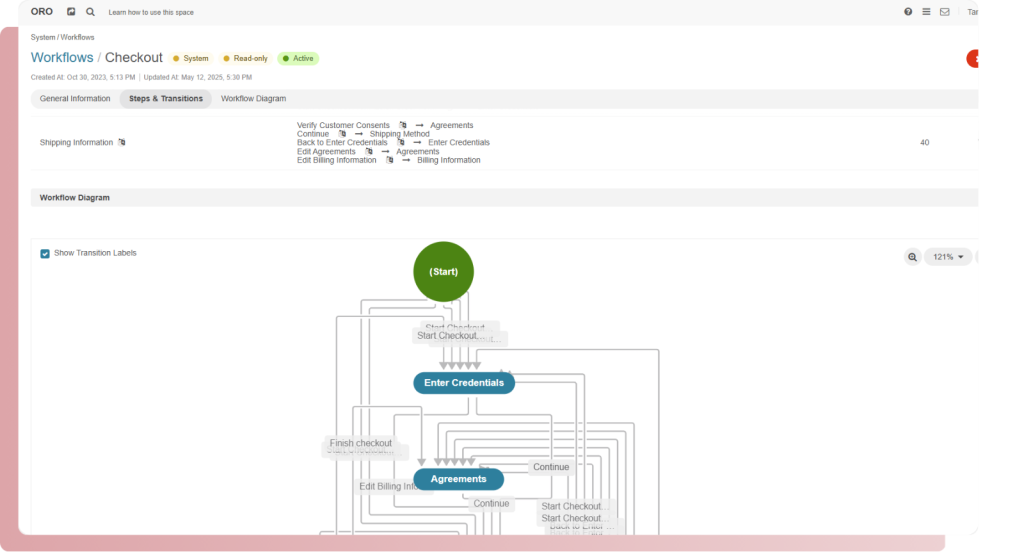
8. Comprehensive Customer Self-Service Portals
A self-service portal acts as a 24/7 control center where your customers can manage their entire relationship with your company. By centralizing order tracking, quote management, and payment information, you empower buyers, reduce the burden on your customer service team, and increase customer loyalty.
Key capabilities include:
- Complete order history with real-time status updates and easy access to invoices.
- Tools to manage quotes, submit payments, and track credit limits.
- Role-based access to ensure users only see information relevant to their position.
- Direct messaging or support features to connect buyers with their sales reps.
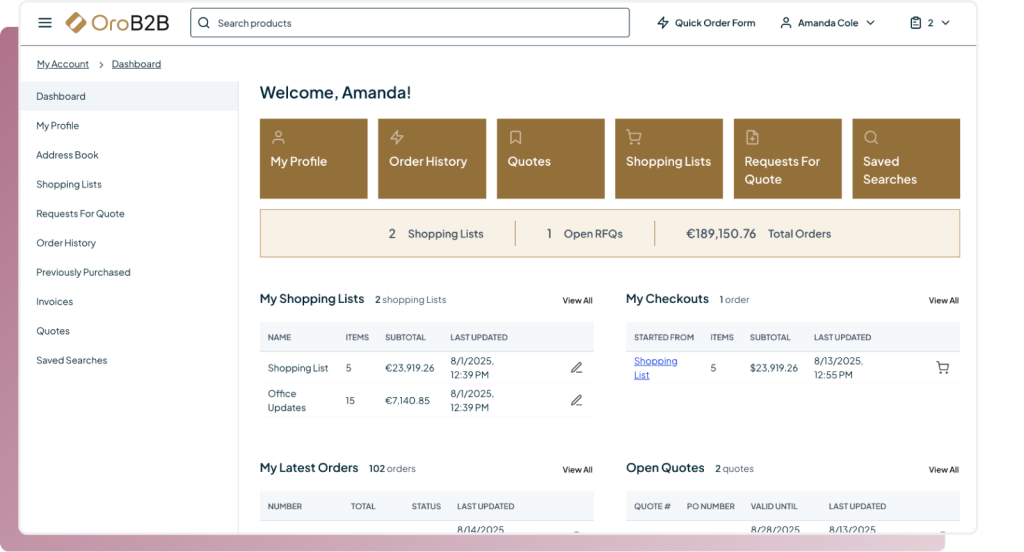
9. Intelligent Search and Data-Driven Personalization
B2B buyers need to find the right products quickly, whether they’re searching by a technical term, a partial SKU, or a product description. An advanced, AI-driven search engine can understand complex queries and deliver accurate results instantly. This data can then be used to personalize the buying experience with relevant recommendations and content.
Key capabilities include:
- AI-powered or vector-based search that understands technical jargon and partial matches.
- Personalization of catalogs, pricing, and content based on customer segment or behavior.
- Account dashboards that provide buyers with insights into their purchasing activity.
- Integration with analytics and marketing automation platforms to create a unified customer view.
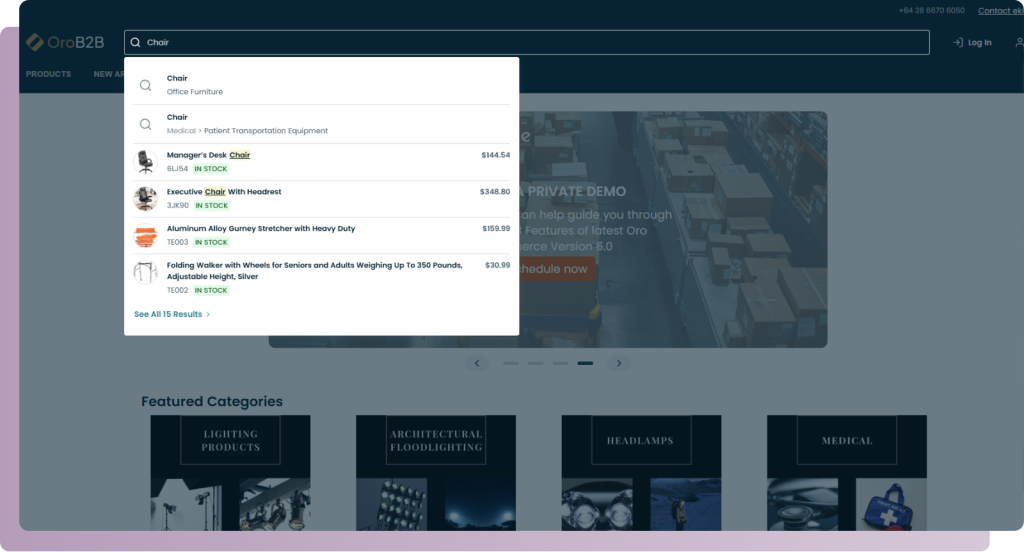
10. Seamless Sales Team Integration
A B2B eCommerce platform should empower your sales team, not replace it. The best solutions provide tools that bridge the gap between digital and human interactions, giving reps the data and capabilities they need to serve customers more effectively.
Key capabilities include:
- Sales Rep Impersonation: Allows reps to log in on behalf of a customer to assist with quotes, orders, or troubleshooting.
- Integrated CRM: A unified view of all customer interactions, orders, and communications in one place.
- Quote Collaboration: Tools that let buyers and sellers work together on draft orders and quotes in real time.
- Mobile Access: A mobile-friendly interface that gives field sales reps access to customer data and ordering tools on the go.
11. Support for B2B2X and Marketplace Models
Today’s supply chains often involve complex networks of dealers, resellers, and service partners. A forward-thinking B2B platform must support these hybrid and marketplace models. This functionality allows you to manage multi-seller catalogs, establish shared workflows, and deliver a tailored experience with unique reporting for every partner in your ecosystem, all managed under one unified system.
12. Enterprise-Grade Performance and Scalability
As your business expands, your eCommerce platform must scale with you without compromising speed. Massive product catalogs, complex pricing tiers, and heavy international traffic can overwhelm lesser systems. A true enterprise-grade platform is architected for high performance and scalability, ensuring your site remains fast and reliable as you grow your data, customer base, and global reach.
Frequently Asked Questions
The most critical features are built for complex business relationships. This includes corporate account hierarchies with multiple user roles, customer-specific pricing and catalogs, and integrated workflows for quotes, orders, and approvals.
A strategic B2B platform automates and streamlines everything from quoting to fulfillment. It provides the efficiency needed to scale operations, gives sales teams better data to work with, and creates a superior customer experience that builds loyalty and uncovers new revenue opportunities.
B2C commerce is designed for individual consumers, featuring simple checkouts and fixed pricing. B2B commerce is built for organizations and focuses on long-term relationships. It supports complex transactions involving multiple decision-makers, negotiated pricing, and recurring, high-volume orders.






